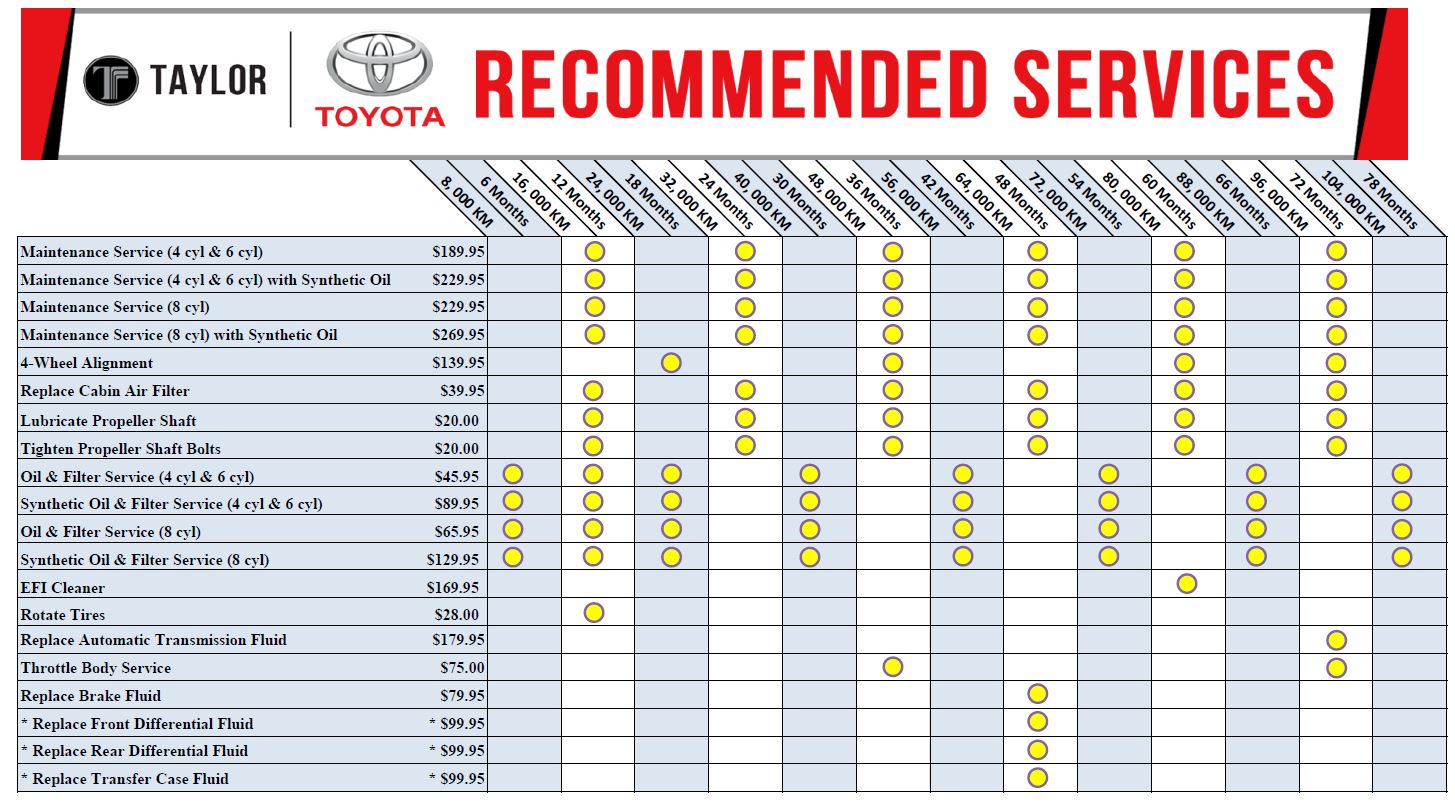Ensuring Longevity: A Comprehensive Guide To The 2025 Toyota 4Runner Maintenance Schedule
Ensuring Longevity: A Comprehensive Guide to the 2025 Toyota 4Runner Maintenance Schedule
Related Articles: Ensuring Longevity: A Comprehensive Guide to the 2025 Toyota 4Runner Maintenance Schedule
Introduction
In this auspicious occasion, we are delighted to delve into the intriguing topic related to Ensuring Longevity: A Comprehensive Guide to the 2025 Toyota 4Runner Maintenance Schedule. Let’s weave interesting information and offer fresh perspectives to the readers.
Table of Content
Ensuring Longevity: A Comprehensive Guide to the 2025 Toyota 4Runner Maintenance Schedule
The 2025 Toyota 4Runner, known for its robust build and off-road prowess, demands a dedicated approach to maintenance to ensure its longevity and optimal performance. The 4Runner’s maintenance schedule serves as a roadmap for responsible ownership, outlining a series of essential checks and services designed to prevent potential issues and maximize the vehicle’s lifespan. This comprehensive guide delves into the intricacies of the 2025 4Runner maintenance schedule, highlighting its importance, key components, and practical tips for maximizing vehicle health.
The Foundation of Reliable Performance: Understanding the Importance of a Scheduled Maintenance Regimen
The 2025 4Runner maintenance schedule is not merely a collection of arbitrary tasks. It represents a carefully curated set of actions designed to anticipate and address potential wear and tear before they escalate into costly repairs. By adhering to the schedule, owners can:
- Preventative Maintenance: Addressing minor issues before they become major problems. This proactive approach reduces the likelihood of unexpected breakdowns and costly repairs, ultimately saving time and money in the long run.
- Extended Vehicle Lifespan: Regular maintenance ensures components operate optimally, minimizing wear and tear and extending the vehicle’s overall lifespan. A well-maintained 4Runner can provide years of reliable service, maximizing its value and minimizing the need for premature replacement.
- Enhanced Safety: Proper maintenance ensures all vital systems, from brakes to steering, function correctly. This contributes to a safer driving experience, reducing the risk of accidents and ensuring peace of mind.
- Improved Fuel Efficiency: A well-maintained engine operates at peak efficiency, translating to better fuel economy and lower running costs.
- Increased Resale Value: A documented maintenance history significantly enhances the vehicle’s resale value, making it more attractive to potential buyers and ensuring a higher return on investment.
Navigating the 2025 4Runner Maintenance Schedule: A Detailed Breakdown
The 2025 4Runner maintenance schedule is typically divided into two categories:
1. Scheduled Maintenance: These are routine services performed at specific mileage intervals. The schedule may include:
- Oil Change: Regular oil changes are crucial for engine lubrication and preventing wear. The 2025 4Runner likely recommends an oil change every 5,000 to 7,500 miles, depending on driving conditions.
- Fluid Checks and Top-Ups: Essential fluids like coolant, brake fluid, transmission fluid, and power steering fluid require regular checks and top-ups to maintain proper performance.
- Air Filter Replacement: A clean air filter ensures optimal engine performance and fuel efficiency. Replacement intervals may vary depending on driving conditions and environmental factors.
- Tire Rotation and Inspection: Regular tire rotations help ensure even wear and extend tire lifespan. Tire pressure checks and inspections are crucial for safety and optimal handling.
- Brake System Inspection: Regularly inspecting brake pads, rotors, and calipers helps prevent brake failure and ensures safe stopping distances.
- Spark Plug Replacement: Spark plugs ignite the fuel-air mixture in the engine. Replacing them at recommended intervals ensures optimal combustion and engine performance.
2. Recommended Services: These are services not tied to specific mileage intervals but are recommended based on driving conditions and vehicle age. These may include:
- Timing Belt Replacement: A timing belt is a crucial component responsible for coordinating engine valve timing. Replacement intervals vary depending on engine type but are typically recommended between 60,000 and 100,000 miles.
- Transmission Fluid Flush: Regular transmission fluid flushes help maintain proper lubrication and extend the life of the transmission.
- Coolant Flush: Flushing the coolant system removes contaminants and ensures proper engine cooling.
- Fuel System Cleaning: Cleaning the fuel injectors and fuel lines helps ensure optimal fuel combustion and improves engine performance.
- Battery Inspection and Replacement: Batteries have a limited lifespan. Regular inspection and replacement when necessary are crucial for starting the engine reliably.
Beyond the Manual: Factors Influencing Maintenance Needs
While the 2025 4Runner maintenance schedule provides a solid framework, several factors can influence the frequency and type of maintenance required. These include:
- Driving Conditions: Frequent off-road use, towing heavy loads, or driving in extreme weather conditions can accelerate wear and tear, requiring more frequent maintenance.
- Driving Style: Aggressive driving habits, such as frequent hard acceleration and braking, can put additional stress on components, necessitating more frequent inspections and replacements.
- Vehicle Age: As the vehicle ages, certain components naturally wear out, requiring more frequent replacements or repairs.
- Environmental Factors: Exposure to harsh weather, extreme temperatures, and dusty or salty environments can contribute to accelerated wear and tear.
Frequently Asked Questions (FAQs) Regarding the 2025 4Runner Maintenance Schedule
Q: Where can I find the 2025 4Runner maintenance schedule?
A: The most reliable source for the 2025 4Runner maintenance schedule is the owner’s manual. It will provide detailed information on recommended services, mileage intervals, and specific instructions for each task.
Q: Can I perform some maintenance tasks myself?
A: While some basic tasks like oil changes and air filter replacements are relatively straightforward, others, such as timing belt replacements or transmission fluid flushes, require specialized tools and expertise. It’s advisable to consult a qualified mechanic for complex procedures.
Q: What happens if I don’t follow the maintenance schedule?
A: Neglecting regular maintenance can lead to premature wear and tear, potential breakdowns, decreased fuel efficiency, and safety hazards.
Q: How often should I get my 4Runner serviced?
A: The 2025 4Runner maintenance schedule likely recommends service intervals based on mileage or time, whichever comes first. It’s best to consult the owner’s manual for specific recommendations.
Q: Can I use generic parts for maintenance?
A: While generic parts may be cheaper, they may not meet the same quality standards as OEM (Original Equipment Manufacturer) parts. Using OEM parts ensures optimal compatibility and performance, minimizing potential issues down the line.
Tips for Maximizing 2025 4Runner Maintenance Effectiveness
- Keep a Detailed Maintenance Log: Maintain a record of all maintenance performed, including date, mileage, and parts used. This will help track service intervals, anticipate future needs, and provide valuable information to potential buyers in the future.
- Use Quality Parts and Fluids: Investing in high-quality parts and fluids ensures optimal performance and longevity.
- Follow the Recommended Service Intervals: Don’t delay scheduled maintenance. Adhering to the recommended intervals helps prevent costly repairs and ensures optimal vehicle health.
- Address Warning Lights Promptly: If any warning lights illuminate on the dashboard, address the issue promptly to prevent further damage.
- Consult a Trusted Mechanic: For complex maintenance tasks, consult a qualified mechanic with experience working on Toyota 4Runners.
Conclusion: Maintaining the Legacy of Reliability
The 2025 Toyota 4Runner maintenance schedule is a vital tool for ensuring the vehicle’s longevity, performance, and safety. By adhering to the recommended service intervals, using quality parts, and addressing potential issues promptly, owners can maximize their 4Runner’s lifespan and enjoy its renowned capabilities for years to come. Remember, responsible maintenance is not just about keeping the vehicle running smoothly; it’s about safeguarding its legacy of reliability and adventure for future generations.








Closure
Thus, we hope this article has provided valuable insights into Ensuring Longevity: A Comprehensive Guide to the 2025 Toyota 4Runner Maintenance Schedule. We appreciate your attention to our article. See you in our next article!